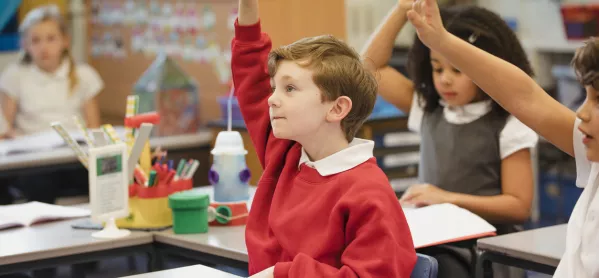School reopenings should kickstart an EYFS fightback
Share
School reopenings should kickstart an EYFS fightback
Very young children are not old enough to understand and obey social distancing rules. Many will still be seeking assistance with toileting, and having toileting accidents. They won’t understand, or be able to follow, a lot of the rules.
But despite the fact that Reception and Year 1 will be, by far, the most difficult group to manage within this frame, they are to be the first back in school.
It’s just the latest misunderstanding about the early years that those working in this phase have had to endure. Put simply: many people don’t seem to understand what happens in these settings.
This was shown clearly with the explicit national impetus to more closely align Reception practice to key stage 1. In late 2017, Ofsted launched an early years policy reflection document entitled Bold Beginnings.
The highly negative attitude to play-based learning in this document took the early years sector by surprise; for example, learning through play was viewed by some consulted as “rosy and unrealistic”.
It especially came as a shock for experienced early years practitioners who remembered that Reception had been taken out of the national curriculum in 2002. At the time, new guidelines were issued that responded to the sector’s concerns that children under 5, and most particularly summer birthdays, were not benefiting from teaching that was designed to meet the needs of much older children.
This matches the contemporary biopsychological model of children under the age of 6, which indicates that cognitive development is heavily dependent on the presentation of concepts rooted in practical, real-life situations accessible to the individual child.
This is recognised by most other nations of the world, in which children typically begin their schooling at six or even seven.
But if all the above and the constant stream of odd policy for EYFS tells us what early years is not, it begs the question: what then are we?
Who do we think we are?
The answer relates to how we construct our model of the child for the purpose of policy creation, literally who do we think we (human beings) are during our earliest developmental years?
Do we start with the child, and design the pedagogy from what we know about the ways in which they reason and learn? Or do we start from the regime we wish to impose, and create strategies that attempt to squeeze the child into the pedagogy?
Related to this is: who do early years teachers think they ‘are’ as professionals; how do they construct their role?
Early childhood education specialist Jan Dubiel calls for a ”responsible ECE pedagogy”.
He highlights the dilemmas of working within a system designed for meeting the needs of older children, reception teachers finding themselves as an isolated voice within the primary school, seeking to promote developmentally-informed while also trying to respond to increasingly dogmatic demands from the “school readiness above all” lobby.
This increasingly leaves reception teachers in a dichotomy in which they are aware of the practice that will best develop the child’s learning capacities at the relevant stage in development, but nevertheless under siege to engage in less appropriate strategies to address agendas underlying the school curriculum.
So let’s start a proper debate. Let’s get some form of consensus. Let’s value the voice of early years experts.
Let’s not continue to blunder our way through an early years policy treadmill and instead challenge it: who does the government think we are? Who do we think we are? And what are we going to do about it?
